In today’s high-stakes world of constant connectivity and ever-increasing demands, stress and anxiety have become familiar yet unwelcome companions in the lives of many. From sleepless nights to tense shoulders and persistent fatigue, the manifestations of chronic stress can significantly disrupt both mental and physical well-being. As a result, more individuals are seeking natural remedies that not only soothe the mind but also fortify the body against the wear and tear of daily stressors. Among these holistic interventions, mushroom tea has emerged as a quietly powerful contender. With a rich tradition rooted in Eastern medicine and a surge of recent scientific validation, mushroom tea is gaining ground as a favored solution. Today, many consumers are exploring mushroom tea brands that specialize in adaptogenic support and calming effects, recognizing their potential to balance cortisol levels, enhance immunity, and support overall mental clarity.
While once considered niche, mushroom teas have now become a mainstream staple in wellness routines. What makes them particularly compelling is their inclusion of adaptogens—natural substances that help the body adapt to stress and maintain equilibrium. Adaptogenic mushrooms like reishi, lion’s mane, chaga, and cordyceps are now the centerpieces of innovative tea blends designed for functional healing. When steeped into a warm beverage, these mushrooms transform into potent reishi drinks or lion’s mane infusions that offer both comfort and cognitive resilience. The best mushroom tea brands take this ancient wisdom and refine it into modern, accessible formats, using organic ingredients, third-party testing, and rigorous quality standards to appeal to the health-conscious consumer.
You may also like: The Essential Guide to Reishi Mushroom Benefits: How to Use Reishi Mushroom Powder for Stress Relief and Adaptogenic Support

Understanding the Adaptogenic Potential of Medicinal Mushrooms
The concept of adaptogens dates back to ancient Ayurvedic and Chinese medicinal practices, where herbalists and traditional healers identified certain plants and fungi that could bolster the body’s stress response without overstimulation. Among these, reishi mushroom tea has long held a revered status. Known as the “mushroom of immortality,” reishi (Ganoderma lucidum) has been historically consumed to enhance longevity, reduce inflammation, and promote inner calm. When used regularly as a reishi mushroom drink, it may help moderate cortisol levels, balance adrenal function, and support restful sleep.
Unlike synthetic anxiolytics or sleep aids, adaptogenic mushrooms work by fine-tuning the hypothalamic-pituitary-adrenal (HPA) axis, the body’s central stress-response system. This nuanced mechanism enables the body to respond more effectively to physical, emotional, or environmental stressors. Beyond reishi, other adaptogenic mushrooms like chaga and cordyceps also offer valuable properties. Chaga is rich in antioxidants and may support immune modulation, while cordyceps enhances energy and stamina, making it ideal for those whose stress manifests as fatigue or burnout. When incorporated into thoughtfully crafted mushroom tea brands, these adaptogens create synergistic blends that gently restore physiological balance.
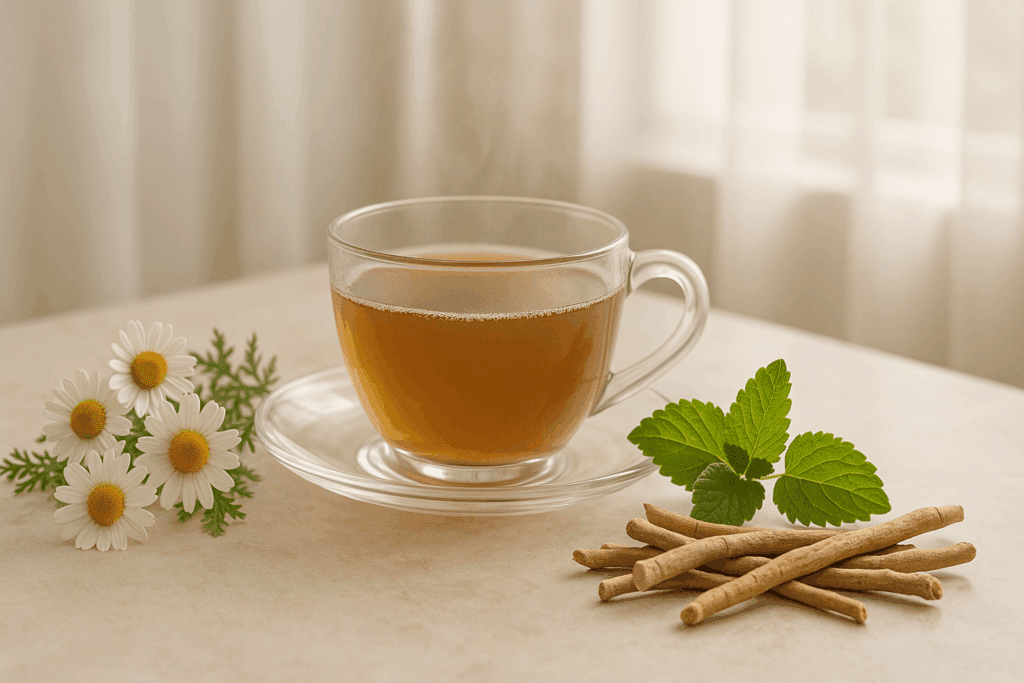
Why Mushroom Teas Are Ideal for Stress Relief and Anxiety Support
Mushroom teas offer a multi-dimensional approach to stress relief that extends beyond their adaptogenic properties. The act of preparing and drinking tea itself has a meditative quality, often encouraging a mindful pause that contrasts sharply with the rushed pace of daily life. This ritual, combined with the bioactive compounds in red reishi tea and other formulations, cultivates a calming experience that soothes both body and mind.
Moreover, mushroom teas are generally caffeine-free or low in caffeine, making them suitable for consumption at any time of day. This is especially beneficial for individuals dealing with anxiety or insomnia, for whom caffeine can exacerbate symptoms. Many mushroom tea brands now include additional calming herbs such as ashwagandha, chamomile, or lemon balm to enhance their stress-relieving effects. The inclusion of these botanicals not only amplifies the therapeutic profile of the tea but also contributes to its soothing aroma and taste.
From a nutritional standpoint, medicinal mushrooms are rich in beta-glucans, polysaccharides that play a key role in modulating immune function. While the primary goal of mushroom teas may be stress relief, their immune-supportive qualities provide a valuable secondary benefit. In this way, a daily reishi mushroom drink serves as both a tonic and a shield, helping the body resist stress-induced immune suppression. As awareness of these multifaceted benefits grows, so too does consumer interest in sourcing high-quality mushroom tea brands that prioritize both efficacy and safety.
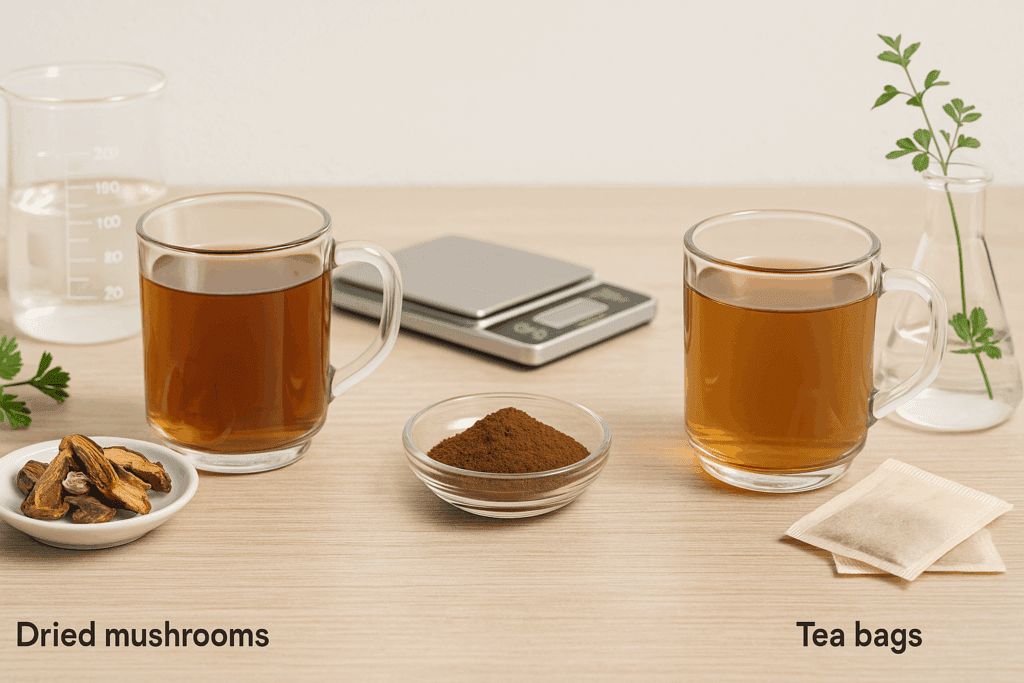
How to Evaluate and Choose the Best Mushroom Tea Brands
Selecting a mushroom tea brand involves more than simply browsing attractive packaging or catchy names. Quality assurance should be the foremost criterion, especially when it comes to ingesting bioactive compounds. Look for brands that use organically grown mushrooms, ideally cultivated on wood rather than grain substrates. This practice ensures a higher concentration of beneficial compounds such as triterpenoids and beta-glucans, which contribute to the adaptogenic and immune-modulating effects of reishi tea and other varieties.
Transparency is another hallmark of a reputable brand. Trustworthy mushroom tea brands will often provide third-party lab results that verify the potency and purity of their products. These lab tests typically confirm the absence of heavy metals, pesticides, and microbial contaminants while quantifying active ingredients like polysaccharides. In the absence of such transparency, consumers may risk ingesting subpar or adulterated products that offer little therapeutic value.
Extraction method is another crucial consideration. While some teas are made from raw, powdered mushrooms, others use hot water or dual extraction techniques to concentrate the bioactive constituents. For reishi mushroom tea in particular, dual extraction (which involves both hot water and alcohol) is preferred, as it captures both water-soluble polysaccharides and fat-soluble triterpenoids. These compounds work together to deliver the full spectrum of reishi’s calming and rejuvenating effects.
Flavor profile, though often secondary to function, is also worth considering. Some mushroom teas have an earthy, bitter taste that may not appeal to all palates. However, many high-end mushroom tea brands now blend their formulations with cocoa, spices, or citrus peels to improve palatability. This balance of taste and efficacy makes it easier to integrate these teas into a daily wellness routine without sacrificing enjoyment.
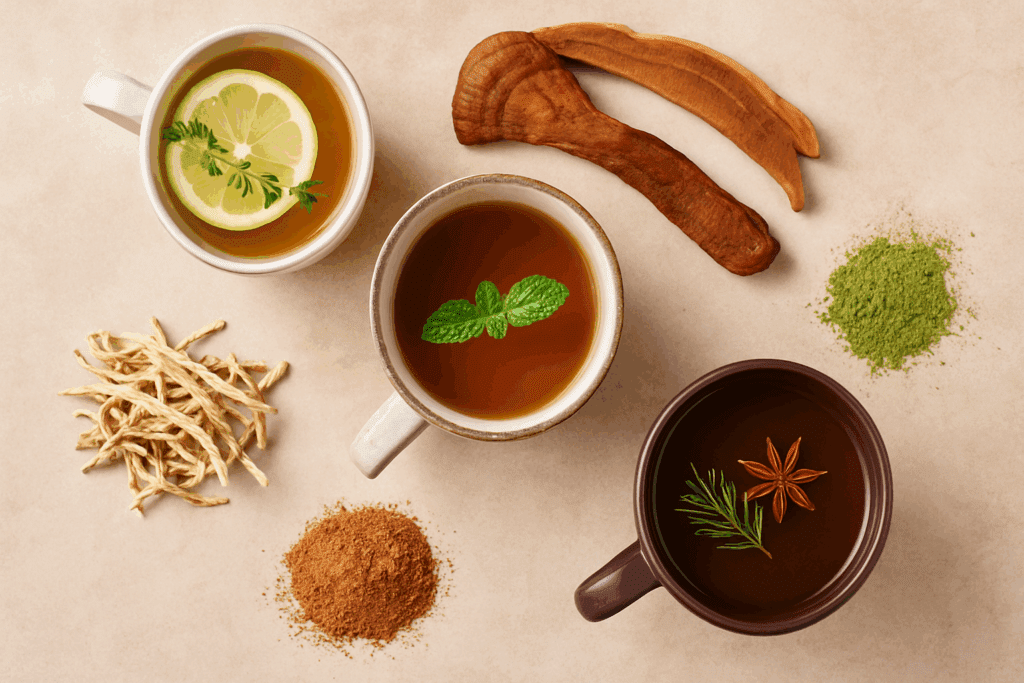
Top Mushroom Tea Brands That Experts Recommend for Stress Relief
With a growing market for medicinal mushrooms, numerous brands now offer high-quality teas designed for stress support and adaptogenic balance. Among the most frequently recommended are Four Sigmatic, Rasa, and Pique Tea, each of which brings a unique approach to mushroom formulation.
Four Sigmatic is perhaps one of the most recognizable names in the functional mushroom space. Their reishi tea blends are formulated for evening use and include ingredients like tulsi and rosehip to promote calm and digestion. The brand emphasizes organic sourcing and dual extraction processes, ensuring that their reishi mushroom drinks are both potent and palatable.
Rasa takes a more Ayurvedic approach, combining adaptogenic mushrooms with herbs like ashwagandha, shatavari, and rhodiola. Their stress-supportive blends are crafted to nourish the nervous system, restore energy reserves, and ease adrenal fatigue. Rasa’s formulations stand out for their holistic design, offering more than just a mushroom infusion—they provide a comprehensive adaptogenic elixir.
Pique Tea is known for its cold-extracted tea crystals, which preserve the antioxidant content of mushrooms and other botanicals. Their Sun Goddess Matcha with reishi and lion’s mane is particularly well-suited for individuals who want a calming yet focused start to the day. The absence of binders, fillers, or preservatives makes Pique a top choice among purists seeking clean-label products.
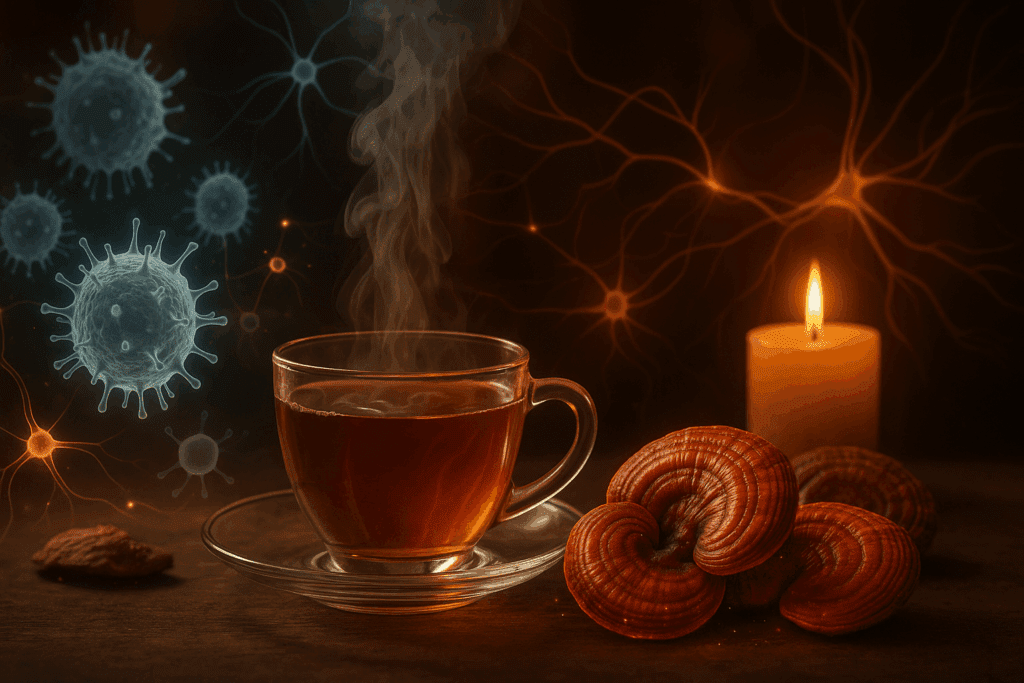
Expert Insight into the Benefits of Red Reishi Mushroom Tea
Red reishi mushroom tea occupies a special place within the spectrum of adaptogenic beverages, thanks to its extensive historical use and growing body of scientific research. Traditionally consumed in China and Japan, red reishi has long been associated with vitality, tranquility, and immune resilience. Its calming effects stem primarily from triterpenoids, bitter compounds that influence the nervous system and support parasympathetic activity. In essence, these compounds help the body shift from a state of fight-or-flight to one of rest and recovery.
Modern studies have begun to corroborate these ancient claims. Preliminary research suggests that reishi mushroom tea may reduce anxiety and improve sleep quality by modulating neurotransmitters such as GABA and serotonin. Animal studies also indicate that reishi may reduce depressive behaviors, although more human research is needed to confirm these findings. Nonetheless, anecdotal reports from users frequently cite enhanced emotional balance and improved restfulness after consistent consumption of red mushroom tea.
One notable aspect of red reishi tea is its cumulative effect. Unlike pharmaceutical anxiolytics that produce immediate but short-lived results, reishi’s adaptogenic properties build over time. Regular use can recalibrate the stress response, allowing for more sustainable emotional resilience. This makes reishi mushroom drink particularly suited for long-term stress management strategies, especially when paired with lifestyle interventions like meditation or breathwork.
The immune-supportive role of red reishi cannot be overstated. Chronic stress is known to impair immune function by elevating cortisol, which suppresses white blood cell activity. By modulating the stress response, reishi mushroom tea indirectly supports immune defense. Moreover, its beta-glucans directly stimulate macrophage and natural killer cell activity, adding another layer of protection against illness.
Mushroom Tea Brands That Excel in Ingredient Purity and Transparency
As the demand for mushroom teas grows, consumers are becoming more discerning about ingredient sourcing and manufacturing transparency. High-integrity brands like Anima Mundi, Earth Pulse, and Teelixir prioritize these values, offering products that meet the highest standards of safety and efficacy.
Anima Mundi Herbals sources its mushrooms from small-scale farms and wild harvesters, ensuring ecological sustainability and traceable origins. Their reishi tea blend is infused with cacao and cinnamon, creating a rich, comforting beverage that doubles as a stress-relief tonic. The brand publishes lab results for each batch, fostering trust through verifiable transparency.
Earth Pulse emphasizes bioavailable formulations that retain the mushroom’s natural integrity. Their red reishi tea is crafted using a slow-steep extraction method that preserves both flavor and therapeutic compounds. In addition to adaptogens, Earth Pulse often incorporates nervines like skullcap and passionflower, enhancing the tea’s calming properties.
Teelixir offers a wide selection of mushroom-based teas and tonics, with a strong focus on purity and potency. Their reishi mushroom tea is dual-extracted and packaged in biodegradable sachets, aligning with eco-conscious values. The company’s commitment to third-party testing and customer education makes it a top choice among health professionals and holistic practitioners.
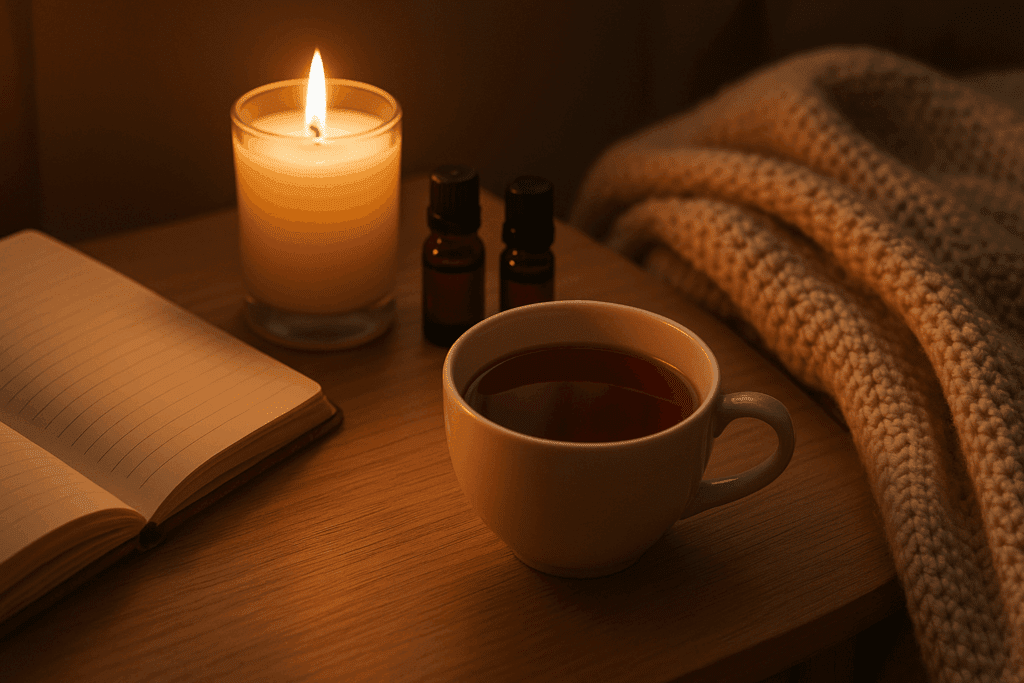
Red Mushroom Tea and Its Role in Daily Self-Care Rituals
Red mushroom tea, particularly when derived from reishi, offers more than just biochemical benefits. It invites users into a sensory experience that fosters mindfulness and presence. This tea can become a cornerstone of evening routines, providing a gentle cue for the body to unwind and transition into rest. The deep, earthy flavor of red reishi tea pairs beautifully with rituals like journaling, yin yoga, or a warm bath, amplifying the tea’s therapeutic effects through context and intention.
Self-care is often misconstrued as indulgent or optional, yet in the context of stress resilience, it becomes essential. The act of preparing a reishi mushroom drink each evening serves as a micro-moment of care, signaling to the nervous system that safety and restoration are available. These repetitive actions accumulate into a kind of physiological training, gradually lowering baseline stress levels and enhancing overall well-being.
Incorporating mushroom teas into daily life does not require drastic change. Many individuals find success by substituting one caffeinated beverage with a mushroom-based alternative or using reishi tea as a wind-down drink before bed. The key is consistency—adaptogens are most effective when used regularly over time. Fortunately, the growing diversity of mushroom tea brands makes it easier than ever to find a product that aligns with personal preferences and wellness goals.
What to Look For When Selecting a Reishi Mushroom Drink
When shopping for a reishi mushroom drink, several practical considerations can guide the selection process. Start by examining the label for the specific species of mushroom used. Ganoderma lucidum is the most studied form of reishi, but other variants may differ in potency or therapeutic profile. Make sure the label specifies whether the extract is from the fruiting body or mycelium—the former is generally considered more potent and desirable.
The form of the tea also matters. Loose leaf teas provide a more traditional experience, while instant mixes offer convenience. Some mushroom tea brands even offer tea crystals or liquid extracts for those who prefer a concentrated dose. The preparation method can influence both bioavailability and flavor, so choose a format that supports your lifestyle without compromising on quality.
Finally, consider the brand’s ethical and environmental practices. Companies that invest in regenerative agriculture, biodegradable packaging, and fair-trade sourcing not only contribute to global wellness but also enhance the integrity of their products. In a market increasingly driven by values, these factors are more than just nice-to-haves—they are critical indicators of a brand’s commitment to long-term health, both personal and planetary.
Frequently Asked Questions: Expert Insights on Mushroom Tea for Stress Relief and Adaptogenic Wellness
What Are Some Overlooked Benefits of Drinking Red Reishi Tea Regularly?
While red reishi tea is primarily associated with stress relief and immune support, a lesser-known benefit is its potential influence on blood pressure regulation. Some clinical observations suggest that long-term consumption may support vascular relaxation due to its triterpenoid content. Additionally, red reishi mushroom tea has shown promise in modulating histamine release, which could benefit those with mild seasonal allergies. Its influence on liver enzyme activity is also under investigation, suggesting possible hepatoprotective properties when consumed consistently over time. Importantly, red reishi tea may also enhance mindfulness and sleep quality indirectly by supporting circadian rhythm stability.
Can Mushroom Teas Be Safely Combined with Other Herbal Supplements?
Yes, mushroom teas often pair well with other herbs, but caution and knowledge are essential. For example, combining reishi mushroom drink with ashwagandha or holy basil can amplify adaptogenic effects without overstimulating the nervous system. However, combining them with sedative herbs like valerian or kava should be done conservatively, especially if driving or operating machinery. Consulting a naturopath or herbalist can help ensure synergistic effects without risk of herb-drug interactions. Overall, mushroom tea brands that offer combination blends often test these formulations for safety, making them a good starting point for experimentation.
How Do Different Mushroom Tea Brands Vary in Their Impact on Mental Focus?
Mushroom tea brands vary widely in formulation, especially when targeting mental clarity versus stress relief. Brands that blend lion’s mane with reishi provide a dual effect of focus and calm, but the ratio and extraction method significantly influence the result. For enhanced focus, look for teas with lion’s mane as the primary ingredient and dual extraction processes that maximize bioavailability. Some brands now include L-theanine, matcha, or cacao to enhance cognitive effects without causing jitteriness. The key is understanding which brand prioritizes mental performance versus those that lean toward calming or sedative blends.
Why Is Red Mushroom Tea Often Recommended for Evening Use?
Red mushroom tea, particularly those using red reishi, is naturally suited for nighttime routines because of its influence on the parasympathetic nervous system. Reishi mushroom tea promotes relaxation without sedation, helping the body wind down after a stressful day. Emerging studies suggest it may increase slow-wave sleep, improving both sleep duration and depth. Additionally, red reishi tea helps to regulate cortisol, which is critical during the evening to signal the body it’s time to rest. For those with erratic sleep patterns, incorporating red mushroom tea consistently into an evening ritual may help re-establish a healthier circadian rhythm.
How Can You Assess the Potency of a Reishi Mushroom Drink at Home?
While lab testing offers the most accurate measurement, there are sensory cues to assess potency at home. A high-quality reishi drink typically has a noticeable bitterness due to its triterpenoid concentration. The aroma should carry earthy and slightly woody undertones, not grassy or overly sweet. If a reishi mushroom tea tastes bland or resembles plain herbal tea, it may lack adequate bioactive content. Additionally, the color of red reishi mushroom tea should be a deep amber or reddish-brown, not pale or diluted. Choosing mushroom tea brands that specify extraction ratios and beta-glucan percentages also helps verify strength indirectly.
How Do Cultural Practices Influence Modern Reishi Mushroom Tea Consumption?
Modern interest in reishi tea is deeply influenced by its traditional use in East Asia, particularly in Japan and China where it’s consumed during spiritual practices and seasonal transitions. In Japanese Kampo medicine, reishi is revered for maintaining ki (vital energy) and is often combined with other herbs based on seasonal needs. Western adaptations have preserved the spiritual roots of red reishi mushroom tea, positioning it as part of mindfulness and self-care routines. Some mushroom tea brands now draw on these cultural origins, incorporating ceremonial-grade ingredients or pairing reishi with botanicals tied to ancestral wisdom. Understanding this cultural lineage adds depth and intentionality to your tea-drinking practice.
What Are Some Misconceptions About Reishi Tea and Its Effects?
One common misconception is that reishi tea acts like a sedative or sleep medication, leading users to expect instant drowsiness. In reality, reishi mushroom tea works gradually by improving the body’s resilience and rebalancing stress hormones. Another misunderstanding is that all reishi mushroom drinks are interchangeable, when in fact the mushroom’s growing conditions, extraction method, and formulation profoundly affect efficacy. Some also assume reishi tea is contraindicated for autoimmune conditions, but emerging research suggests it may help regulate, not overstimulate, immune function—although individual responses vary. Finally, expecting red reishi tea to work in a single dose overlooks its long-term adaptogenic nature.
Best Practices for Selecting High-Quality Mushroom Tea Brands
When choosing among mushroom tea brands, prioritize those that clearly label the mushroom species and specify whether extracts are from fruiting bodies or mycelium. Brands that use dual extraction methods are preferable for reishi teas, as they retain both water- and fat-soluble compounds. Verify whether the product is USDA-certified organic and avoid brands that use vague terms like “proprietary blend” without disclosing ingredient quantities. Transparent companies will also publish third-party lab results confirming beta-glucan content and absence of contaminants. Lastly, look for packaging that protects against oxidation and moisture, such as amber glass jars or foil-sealed sachets.
How Do Emerging Trends in Functional Beverages Affect Mushroom Tea Development?
The functional beverage market is rapidly evolving, and mushroom tea brands are adapting by incorporating nootropics, collagen, and even probiotics into their formulas. Red reishi mushroom tea is now being paired with ingredients like magnesium glycinate or GABA to deepen its relaxing effects. Meanwhile, cold brew reishi drinks and carbonated mushroom infusions are emerging to appeal to a younger, health-conscious demographic. Brands are also experimenting with adaptogen stacks, combining reishi mushroom drink with CBD or functional roots like maca. As consumer demand shifts toward convenience and innovation, mushroom tea continues to reinvent itself while preserving its foundational benefits.
What Role Does Timing Play in the Effectiveness of Reishi Mushroom Tea?
Timing significantly impacts the effectiveness of reishi mushroom tea. Drinking reishi tea on an empty stomach may improve absorption of its active compounds, particularly polysaccharides and triterpenoids. However, those with sensitive digestion might prefer consuming it after a light meal to avoid gastrointestinal discomfort. Morning consumption may still be beneficial for individuals using reishi tea for immune modulation rather than sleep. That said, most find a reishi mushroom drink to be most effective when consumed one to two hours before bedtime as part of a wind-down ritual. The key is consistency—using red reishi tea at the same time daily enhances its regulatory effects on the stress axis and sleep-wake cycles.
Conclusion: Why Expert-Backed Mushroom Tea Brands Are a Smart Choice for Stress Relief and Resilience
In an era where stress-related disorders are on the rise and pharmaceutical interventions often come with undesirable side effects, the return to natural remedies like mushroom tea is both timely and necessary. These teas offer a rare combination of ancient wisdom and modern science, delivering adaptogenic support through safe, accessible, and enjoyable means. Whether you are sipping a reishi mushroom drink to ease into sleep or starting your day with a lion’s mane infusion for mental clarity, these brews offer more than temporary relief—they build long-term resilience.
Mushroom tea brands that uphold high standards in sourcing, transparency, and formulation are leading the way in this growing wellness category. Their offerings not only satisfy the demand for effective stress relief but also align with broader values of sustainability, integrity, and holistic care. As consumers become more educated and intentional about their health choices, these brands provide a trustworthy pathway toward balance and well-being.
Ultimately, the daily ritual of drinking red reishi tea or any other adaptogenic mushroom blend becomes more than just a health practice. It becomes a declaration of self-respect, a quiet but powerful stand against the relentless pressures of modern life. In embracing expert-recommended mushroom tea brands, we find not only relief from anxiety and fatigue but also a deeper connection to the rhythms of nature and the wisdom of tradition—an integration that is, in itself, profoundly healing.
Further Reading:
6 Benefits of Reishi Mushroom (Plus Side Effects and Dosage)
